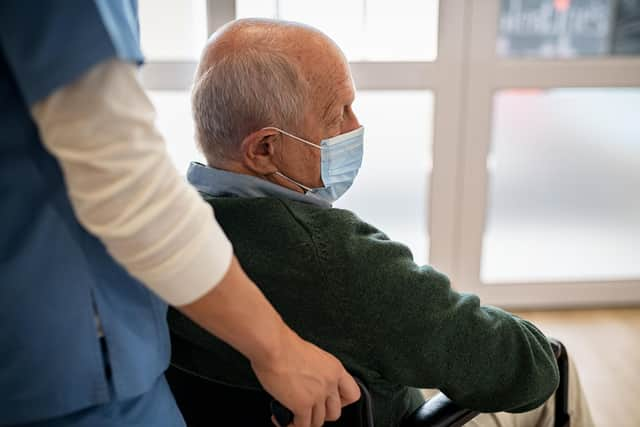How Scotland can foster an integrated health and social care system - Justene Ewing comment
We’ve seen the bravery of doctors, nurses and carers as they work on the frontline of a pandemic that’s claimed more than 150,000 UK lives.
However, Covid has also revealed the desperate need for a reboot in a system feeling the strain and a workforce that is exhausted. This reboot must be focused on a person-centred approach to system redesign, enabled by technology, and extending right across health and social care.
Advertisement
Hide AdAdvertisement
Hide AdI have been involved with health in public and private sectors for a decade. I was head of digital transformation at NHS24, where I delivered new strategies, including new clinical and digital services for patients, clinicians and care-providers.


I set up the Scottish Government’s Innovation Centre, the Digital Health and Care Institute, which looked to develop partnerships in areas where collaboration could prove complex.
As chief executive, I led as a facilitator to understand the issues, enabling partnership working, testing and implementation of digital solutions in a considered way. Health innovations introduced by the organisation included the avoidance of unnecessary colonoscopies by using a pillcam to take images as it moved through the digestive system.
Above all, I learned that Scotland has a huge capability in the public, private, and academic sectors. Combined, they can make a powerful force for change in terms of being outcome-focused for the patient or service-user, the workforce, the system and the economy.
Four years ago, I joined CGI, a values-led IT, systems integrator and business consulting services organisation with a global reach. We are trusted to deliver challenging, complex and sensitive transformation programmes across 40 countries.
I have seen financial services, retail, education, transport, cyber security and energy significantly transform to address changing needs, fix significant challenges, and build innovation and sustainability into the heart of organisations.
We can do the same for health and care. But this challenge is not new. In 2006, Sir David Varney set up a review examining how the government used technology to deliver services to the public. It made two key findings: IT services must be designed around “the citizen”, and there must be an increased culture of shared services. Service transformation and value to the public purse was at the report’s heart.
In 2011, the Christie Commission reported on the future delivery of Scotland’s public services. Among its findings were recommendations to build services around people and communities, and that organisations should collaborate more effectively, especially by delivering integrated services to secure well-being improvements and reduce health inequalities.
Vital
Advertisement
Hide AdAdvertisement
Hide AdYet here we are in 2021 with the same issues, now exacerbated by Covid-19. Yes, it is vital we “keep the lights on”. But it’s also vital that we build a system fit for purpose and create the time and space to ensure transformation occurs.
The top priority is ending the current system of working in silos. Patients and service-users have to tell their stories multiple times to multiple people. An integrated, whole-system approach to service redesign, starting with the person in their own home and being enabled in the community, offers the opportunity for significant improvement.
Health and care systems must also tap into our ever-expanding data goldmine. The use of health apps is soaring. People download them onto Apple Watches and iPads, and Fitbits have been introduced to both young and old alike.
Homes are smarter – smart meters are provided free of charge and establish connectivity regardless of financial status. They support the ability to determine patterns of living at home and whether someone is living in fuel poverty.
Yet health, care, unpaid, voluntary and third-sector professionals have an active role in supporting the vulnerable but no way of sharing data. Similarly, welfare, primary, acute, dentistry and pharmacy can’t easily share full visibility of data and insight on a person in order for us to make better decisions and improve outcomes.
Opportunity
We are wasting a golden opportunity to do things differently at a time when there has never been a greater need for change.
I have seen this first-hand. My 18-year-old son Kieran’s first job was as a home carer. He came home on a real high in his first week after being taught to safely remove and clean catheters and re-insert new ones. He oversaw medication adherence, personal hygiene, and food consumption.
But he would not be permitted to do a routine blood-pressure check using a digital cuff, take a pinprick of blood to check diabetic sugars, or check a wet wound for weeping. A community nurse or GP would have to come out, often requiring no intervention.
Advertisement
Hide AdAdvertisement
Hide AdUnlike the health profession, there is no professional career path for carers. We do not have carer practitioners (although speaking to a colleague in National Education Scotland, I am delighted to hear this is now being considered). We must understand the role data and technology have to enable them properly while reducing the administrative burden on our workforce to enable more hands-on time to deliver better clinical and care outcomes.
Private companies like CGI can be part of this. We can assist and augment the public sector rather than take services and responsibility away from them. We are willing to answer a call to arms.
Scotland has one of the most innovative digital economies, the best universities and a talented health and care workforce. Let’s begin working collaboratively now for a better future.
Justene Ewing, vice-president, health and care for CGI in the UK
A message from the Editor:
Thank you for reading this article. We're more reliant on your support than ever as the shift in consumer habits brought about by coronavirus impacts our advertisers.
If you haven't already, please consider supporting our trusted, fact-checked journalism by taking out a digital subscription.
Comments
Want to join the conversation? Please or to comment on this article.
